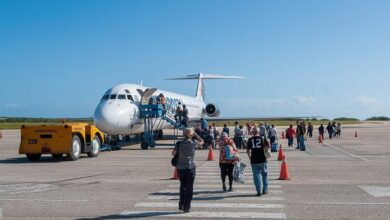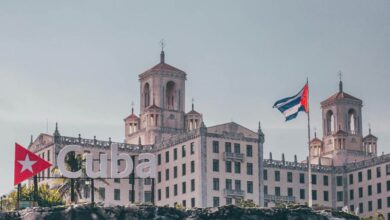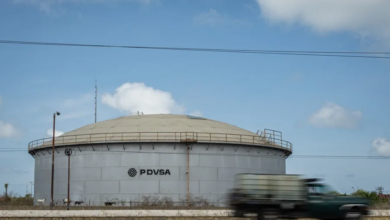Duque’s Presidency, a year with ups and downs
In LatinAmerican Post we review the events that have marked his first year as president of Colombia

Listen to this article
Leer en español: Gobierno Duque, un año con más bajas que altas
Colombian President, Iván Duque, in Bogota, Colombia. EFE / Mauricio Dueñas Castañeda
LatinAmerican Post | Laura Viviana Guevara
August 7 marks a year since Iván Duque assumed the presidency of Colombia. Although in his speech he promised not to polarize the country anymore, the truth is that the reality seems different. From LatinAmerican Post we review the events that have most marked his first year as president.
Low popularity
In this year, and according to different surveys conducted to Colombians, his approval and credibility have been more in negative figures than in positive ones.
According to a survey carried out by Invamer, on July 2019, Colombians disapprove of the president's management by 56.5 percent; unlike September 2018 when its level of disapproval barely reached 32.7 percent. However, disagreements with the government were rising more and more.
In December last year, according to a survey conducted by Datexco, 78 percent of respondents disagreed with his policies. The above due to the lack of resolution of his first crises within his government.
One of the biggest criticisms was student strike, where the president was required to increase the budget for education. Despite insisting that "there was no budget" and not making an appointment to establish a direct dialogue with students; thirteen mobilizations and two months later, Duque and the students reached an agreement, amid criticism from the opposition.
The other crisis that he had to face was the controversial tax reform, which was signed and implemented as soon as 2019 began and with which it was expected to raise “7.5 of the 14 billion that was planned to be collected with the first proposal” (with which VAT would be imposed on the products of the family basket), according to Pacifista. The changes occurred in an adjustment to the taxable base to collect the income tax; the multi-phase VAT on beers and soft drinks, attacking evasion and the reduction of corporate taxes.
Read also: Colombia coca cultivation down slightly, UN report says
Unemployment
However, with a new year come new concerns. According to statistics provided by DANE, in June 2019, the unemployment figure reached 9.4 percent, rising three percentage points from the previous year.
Finance Minister Alberto Carrasquilla, who also suffers from low popularity among Colombians, said he did not understand the reasons why unemployment rose such a high number.
According to the Invamer survey, one of the most recent, unemployment is not only the number one concern of Colombians but one of the main reasons for the president's low popularity.
As a way out of the crisis, Duque announced a series of agreements with several businessmen to boost economic growth in the country; having as goal the creation of around 860,000 jobs.
Los 12 Pactos por el Crecimiento y la Generación de Empleo son una apuesta por el fortalecimiento de la economía, a partir del más importante motor que puede tener una sociedad democrática que son sus micro, pequeños, medianos y grandes empresarios. #CreciendoConOportunidades pic.twitter.com/YZ1arZCn0w
— Iván Duque (@IvanDuque) 5 de agosto de 2019
His constant trips abroad
Within a president's agenda, his trips abroad are key, since they allow for new political and economic relations to be opened.
However, in the first year as president, Duque has made more than 20 trips abroad. Although they have been presented as official trips because they include a work and meeting agenda with the respective presidents, the fact that he has been more outside the country than inside leaves a bad taste for most Colombians.
Highlighting that it is only his first year of government, in the trips abroad of the president, the government has spent around 1,500 million pesos; a bizarre figure considering that former president Andrés Pastrana, known for his constant travels, during his four years as president, spent 3.941 million pesos, according to figures revealed by La FM.
However, according to a press conference offered by the Foreign Minister, Carlos Holmes Trujillo, the trips allow “the speeding up of decisions, the mobilization of the political will of the States and the facilitation of new elements of cooperation and joint action with the countries with which Colombia is related”.
He added that these tours "bring great results for Colombia in terms of cooperation, as well as announcements of additional support for migratory crisis attention and resources for cooperation in climate change, education and science."
Giras como la del presidente @IvanDuque por Europa traen grandes resultados para Colombia en materia de cooperación, al igual que anuncios de apoyos adicionales para atención de crisis migratoria y recursos para cooperación en cambio climático, educación y ciencia
— Carlos Holmes Trujillo (@CarlosHolmesTru) 24 de junio de 2019
In addition, he announced the results of the tours: “In the United Kingdom important agreements were reached that include resources for Colombia, such as the one that has to do with scientific cooperation for 3.5 million pounds sterling”; in France “it was announced that the country wants to participate in the attention to the problems in the border area; a historical agreement for the protection of the environment,” among others.
Governance
Within a year of the presidency, the relationship between the president, the Congress, and the opposition parties has not been the best, since many of the important bills proposed by Duque have not seen the light within the Congress.
Iván Duque was jumped up to the presidency under the endorsement of Centro Democrático, right-wing party whose leader is the current senator Álvaro Uribe Vélez.
During the peace process carried out in the previous government, Centro Democrático was one of the parties that most opposed its realization. When the president tried to object to the JEP (a jurisdiction to exercise judicial functions, which will be valid within the framework of the end of the armed conflict), he had the support of his party, as it had been the flag of his candidacy. However, Congress decided not to pass the controversial Statutory Law by 110 votes against 44.
| Hoy a las 2 p.m., la @JEP_Colombia abre en Corozal (Sucre) su primera oficina fuera de Bogotá.
¡Estamos en los territorios y trabajamos por la verdad plena!
Leer nota: https://t.co/remIFFWN7o pic.twitter.com/JfSWUXVrEI— Jurisdicción Especial para la Paz (@JEP_Colombia) 5 de agosto de 2019
Among the few laws that Congress passed, he classified the controversial tax reform, but the Duque government could not sing a complete victory since much of what was initially proposed was cut.
Also, how the president relates to the opposition has not been the best, since in May 2019, “Duque met with different political parties to seek a great national pact, however, he did not invite the opposition,” according to El País.
On the other hand, another of his main criticisms is with the closeness of former President Álvaro Uribe, because although he is the director of the party to which the president belongs, the absence of Duque has allowed it to be affirmed that who is ruling is Uribe. In this regard, Duque has not expressed himself since in different situations he has referred to Uribe as “president”.
No hay nada como escuchar que Uribe y Duque se traten mutuamente como: PRESIDENTE¡¡¡¡¡ pic.twitter.com/zru4X5MjqU
— FishEye(@fabiansu20) 13 de febrero de 2019
You may want to read: Colombia will give citizenship to children of Venezuelans born in its territory
Venezuela
Faced with the massive migration of Venezuelans caused by the political and economic instability of the neighboring country, the issue of Venezuela has been on the majority of the president's agenda. In many of its visits to different countries, the crisis is one of its main issues, as help is sought to try to solve the crisis.
Duque was one of the first leaders to recognize Juan Guaidó as president and his insistence and proximity to the Venezuelan problem has also generated criticism.
Especially when the country has left unattended issues, such as insecurity and murders of social leaders; the crisis in the east of the country with the closure of the road, among others.
Not everything is bad
Although it has not been a good year for the president, everything has not been bad either. The minimum wage increase 6 points; the handling of criminal gangs and outside the law; economic growth that has exceeded 3 percent; the eradication of more than 2,000 hectares of coca crops and its approach to the government of China to sign several trade agreements and be more present in the panorama of the world's second economy.
Como parte de la #VisitaOficialAChina acompañamos al Presidente @IvanDuque a un encuentro con más de 200 empresarios. La diplomacia proactiva tiene entre sus objetivos fortalecer y promover la inversión en nuestro país y la apertura de mercados para los productos colombianos pic.twitter.com/GQAksyluMl
— Carlos Holmes Trujillo (@CarlosHolmesTru) 30 de julio de 2019
What's coming
The next three years will be crucial for the Duque government because unlike his predecessors, especially Álvaro Uribe and Juan Manuel Santos, the president will have only four years to fulfill what he proposed in the campaign. Within his second year as president, Duque will have to improve his relationship with the opposition, because, without it, little or nothing can be done in Congress.
Similarly, from the hand of his cabinet, he said they will work "to achieve economic growth of 4 percent this year and that in 2022 unemployment will drop to 7.9 percent," according to El Tiempo. However, the government will also have to work on the security of the citizens, as more and more organized armed groups take control of the country and despite the response of the Armed Forces, the death of social leaders and demobilized people have not yet been controlled
Although it has not been a good year, Duque still has three long years where he can prove that he is capable.





